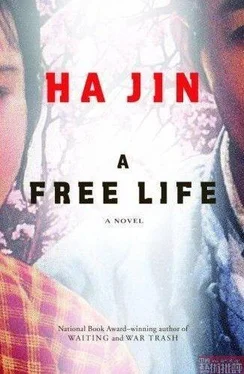"Is zis someplace in Florida?" He pointed at the middle piece. "No, I painted them in Montana."
"No wonder zer vegetation wasn't lush. So no everglades and gators, huh?"
"No." Kent Philips chuckled, rather shy. "I wanted to make the landscape sparse but infused with light."
"Zat's clear. These pieces don't blaze but shimmer. Zat's what I like most about zem. Zey're full of a quiet dignity."
"Thanks! Do you paint?" Obviously he regarded Nan as a fellow artist.
"I write," Nan said reluctantly. "What kind of work do you write?" "Poetry."
"Wow, I can't imagine doing that, although I like poetry too. You must give me the titles of your books so I can get a copy at the bookstore in my town."
"I haven't pahblished a book yet." Nan was slightly embarrassed.
"I know poetry is hard, but don't give up. When you reach a certain point, good things will happen, as long as you persevere."
"I'll remember zat."
A young waiter came over holding a tray of green olives stuffed with pimento, which they both passed up. Kent gave Nan his card and invited him to come visit if he was ever in Florida. Nan was pleased and felt a kind of warmth rising in him, though he knew it was unlikely he'd see this man again. It was odd that he felt so uncomfortable to be with Bao despite having known him for years, whereas with Kent Philips, a stranger, he was at ease, not having to weigh his words or resort to social rhetoric.
Before leaving the show, Nan looked around for Bao to say goodbye. In the section of handcrafted works, he saw his friend conversing with a delicate black woman dressed in red silk and holding a flute of champagne. She was the artist who had made the gorgeous, menacing masks hanging on the wall behind her. As Nan approached them, he overheard Bao praise the lady's work, "Beautiful hand-job, very special."
"Handiwork!" she corrected.
"Yes, I mean everything done by hand."
Nan edged away while fighting down the laugh rising in his throat. He slipped into an anteroom and went out of the gallery. A chilly wind swept up a few dead leaves, which were rattling and scuttling before a Dumpster on which perched half a dozen crows. The moon looked bloody, like a giant rotten orange. Nan sank into thought on his drive back, and wondered if Bao would be displeased by his French leave. For the rest of the evening in the kitchen he couldn't stop imagining a kind of dark poetry that possessed a luminosity similar to that in Kent Philips's paintings.
THESE DAYS Nan and Pingping were priming Taotao for the SATs. The boy was just an eighth grader, but he had been selected to join in a talent survey, whose participants were to take the regular SATs in November. Nan gave his son a clothbound Oxford American Dictionary and asked him to highlight all the word entries he didn't know and then review them later on. Once Taotao finished the whole book, Nan would pay him a hundred dollars. The boy was reluctant, but his father convinced him that this would increase his verbal score considerably. More important, he would learn many new words. Even if he couldn't finish reading the dictionary before sitting for the SATs, he could continue to work on it afterward and earn the promised money. Taotao was eager to use the cash for a sound card for his computer, so he agreed to do the work. As for math, Pingping took care of that. In fact, she hardly needed to do anything, already having taught him a great deal.
"I know I'm going to blow it," Taotao complained to his parents. "I'm going to make a fool of myself. Nobody in my grade will take the SATs this year. This is silly and outrageous. And if I come out all right, people will think of me as a whiz kid. I don't want to be a whiz kid who's just a parrot. I want to be like everybody else."
"It's an honor to be a part of zer talent search," Nan said.
"I have no talent and don't want the honor. Let them experiment with other rare birds, not me. I won't take the tests."
"You just scared," Pingping put in. "If you don't do it, I won't teach you anymore. You can decide yourself."
"Mom, you're so cruel!"
Despite his protests, Taotao did sit for the SATs on the last Saturday in November. He wasn't sure if he had done well. His parents told him not to worry since there'd still be three years before he took the real tests for college. Four weeks later the scores came: math 710 and verbal 580. His parents were very pleased. For years Nan had worried about how to pay his son's college tuition; now it was clear that the boy would be able to get a scholarship from a decent school provided Taotao became an American citizen. Nan felt relieved and urged his son to continue to read the dictionary, of which Taotao had covered merely 350 pages, less than half the book. The SAT results got Taotao qualified for the summer programs for gifted kids at both Duke and Johns Hopkins, but he wouldn't be able to attend either of them because his parents didn't believe in them and couldn't afford the tuition. There was a chance that he could get a scholarship for the programs, but he preferred to stay home in the summertime.
NAN had applied for U.S. citizenship three months earlier. The naturalization would take at least half a year to complete. Only after he became an American citizen could Taotao and Pingping begin their naturalization. Nan hadn't applied for the citizenship with a light heart, but this was the only sensible thing to do. Besides the need for Taotao to become an American, Nan felt he had been disowned by China long ago. There wasn't another place where he and his family could and wanted to live. His home and livelihood were here. The previous spring he had read an article by Yong Chu, the old poet teaching Chinese at a college in Rhode Island, whom Nan had seen six years earlier at the memorial meeting for those killed in the Tiananmen massacre. In his article, "Why I Don't Want to Be an American Citizen," Mr. Chu wrote candidly that he was unsure which side he would take if the United States went to war with China. The citizenship would require him to be willing to bear arms to defend the U.S. Constitution and fight any foreign enemy, at least participating in noncombatant service in wartime. Chu stated that his heart wouldn't allow him to side against his motherland and that he wanted to live honestly, so he wouldn't get naturalized. Now Nan wasn't certain which side he'd take if a war broke out between China and the United States. This uncertainty tormented him, but he also knew that once he swore his allegiance at the oath ceremony, he'd have to abide by his word. To him, a promise should weigh more than a country.
He thought of a pair of metaphors, comparing China to his mother and the United States to the woman he loved. He was sure that someone else had used this trite analogy before; nonetheless, it helped him sort out his emotions. As a grown man he couldn't live with his mother forever and must choose to join the woman of his heart. Certainly he wouldn't taunt or beat his mother if there was a fight between the old lady and his beloved. All he could do was help them understand each other even though they might never see eye to eye. It was with this intention that he went to a meeting held in the community center in Chinatown.
Recently two young journalists in mainland China had published a book entitled China Can Say No, which vehemently condemned the United States as China 's archenemy. The book was poorly written and full of errors and distortions, but it had gone through many reprints. The authors went so far as to claim that China would "incinerate Hollywood " and "let the United States suffer the ax of war." Clearly some top officials had endorsed the publication of this book, using hatred and fear to unify the populace. The book caused quite a stir in the Chinese diaspora as well, so the Chinese community in Atlanta had invited scholars, writers, students, and people of various walks to discuss it on a Saturday afternoon in early January.
Читать дальше












